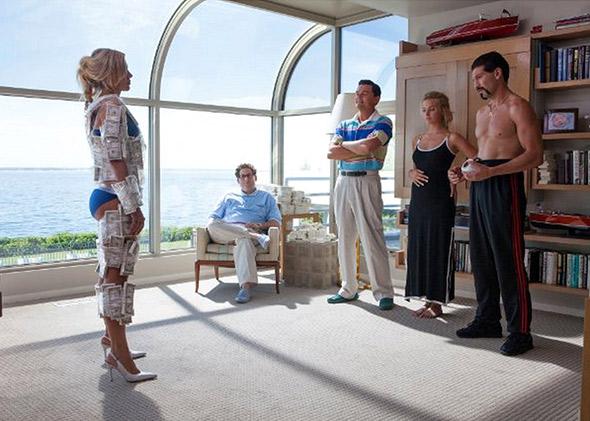Remember that scene in The Wolf of Wall Street when Leonardo DiCaprio (as the crooked stockbroker Jordan Belfort) and Jonah Hill (as his right-hand man and chief enabler Donnie Azoff) do an obscene amount of drugs and ostentatiously throw around their swindled millions and just generally act like complete amoral tools? No, the other one. No, the other other one. The truth is, that description fits nearly every scene in this three-hour-long movie. Epic in size but claustrophobically narrow in scope, The Wolf of Wall Street maintains a near-exclusive focus on the greed and self-indulgence of its proudly rapacious hero. Sometimes in voice-over, sometimes directly addressing the camera, Jordan narrates his and Donnie’s booze-and-Quaalude-fueled monkeyshines (which range from snorting drugs out of a hooker’s ass to throwing dwarfs-for-hire at a Velcro target board) in a cocky, self-satisfied tone. Hindsight and jail time, it seems, have done nothing to tarnish Belfort’s memories of how awesome it was to be young, high, and rich with other people’s money.
Mind you, this is not to suggest that Belfort’s amorality is in itself a fault of The Wolf of Wall Street. Unredeemed jerks can make for transfixing movie heroes (and DiCaprio has played not a few such characters, from the slippery trickster of Catch Me If You Can to the shirt-tossing profligate of The Great Gatsby). But Scorsese and Terence Winter (the Emmy-winning Sopranos writer who adapted Belfort’s memoir for the screen) overestimate the audience’s ability or desire to watch Leo misbehave. The story’s relentless, unvarying rhythm—malfeasance, consumption, more malfeasance, more consumption—leaves the audience drained and annoyed. There’s a comic/horrific set piece late in the movie in which Jordan, too zonked on ‘ludes to form a coherent sentence, literally drags himself on his belly to his waiting sports car for a very ill-advised drive home from his country club. Coming as the culmination of a well-shaped storyline about Jordan’s mounting drug addiction and self-destructiveness, this scene might have been as bleakly funny as Scorsese (judging by how lovingly he documents every second of that crawl) seems to find it. But given that we’ve been watching this man get wasted and do stupid stuff for the past two hours already, Jordan’s arduous car crawl merely seems like an amplified (and endless) replay of what’s come before—for example, the early scene in which Donnie and Jordan play hooky from their job trading penny stocks at a low-rent Long Island brokerage firm to try out a promising new street drug called “crack.”
I don’t mean to suggest that no coherent narrative worms its way into the 180-minute party montage that is The Wolf of Wall Street. The best scenes involve Jordan’s attempts to stay just out of reach of the FBI agent Patrick Denham (a blessedly understated Kyle Chandler), who’s trying to gather enough evidence to nail Jordan on insider trading, tax evasion, or whatever he can get. The film’s single strongest moment happens during a cat-and-mouse conversation between the two men that takes place on board Jordan’s cartoonishly luxurious yacht. (It has a helipad complete with helicopter.) While Jordan drops broad hints about bribery—he understands the hardships of working in law enforcement, he could find ways to make Denham’s life easier, etc.—the canny agent lies in wait for his mark to say something explicitly incriminating. This yacht scene crackles with the macho gamesmanship and latent violence that Scorsese so deftly explored in Goodfellas—a film this one resembles, for the most part, only superficially.
The Australian actress Margot Robbie, who has the brittle, impossible prettiness of a life-sized Barbie, makes the most of her underwritten role as the “Duchess of Bay Ridge,” the outer-borough beauty who seduces Jordan away from his first wife. A scene where she sexually humiliates her husband in front of their baby’s crib, only to become the victim of Jordan’s turnabout nasty trick, points at the dark domestic comedy this could have been had Scorsese spent more screen time developing that relationship.
Instead, there are a lot—a lot—of chemically enhanced dude-bonding scenes between DiCaprio and Hill, in between stylishly edited montages of churning stock tickers, ecstatic trading floors, and writhing strippers. Thelma Schoonmaker, Scorsese’s longtime editor, makes these individual fragments of storytelling feel kinetic and propulsive (aided by the soundtrack of pop, jazz, and blues songs by everyone from Billy Joel to Cannonball Adderley.) But even the best editing can’t create story out of a vacuum, and the world as Scorsese lets us glimpse it through Jordan Belfort’s eyes is pretty vacuous. I suspect that Scorsese chose to tell the story of Belfort’s late-‘80s/early-’90s rise and fall as a commentary on the 2008 crash, but it’s not clear what comment is being offered, since the only affect available to the viewer after the second straight hour of gonzo young-banker high jinks is a numb combination of boredom, disgust, and (I guess, if you aspire to snort coke out of prostitutes’ bums and mistreat your yacht captain) envy. Unlike the hapless marks that Jordan and Donnie sweet-talk into buying penny stocks, I just can’t bring myself to invest.
